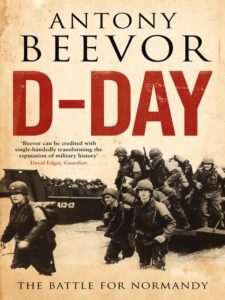When it comes to searing accuracy coupled with the emotional resonance of a powerful novelist, Antony Beevor is unsurpassed. His previous works include the remarkable ‘Berlin – The downfall 1945’ which chronicles in gruesome detail the final throes of the third Reich and ‘Stalingrad’ which retells the astonishing and powerful story of one of the pivotal battles of WWII when the Nazi machine was finally ground down by the resilience and sheer numbers of Russian forces.
For ‘D-Day’, however, Mr Beevor turns his attention to the Western front and chronicles in utmost detail the Normandy landings and their immediate aftermath. What makes the book stand out is not only the myriad detail included but also the humanity which shines through the writing style. While history can be a demanding topic and war history in particular can be morale sapping with the sheer horror invoked by the mounting death tolls and horrific injuries incurred by those who were there proving an enervating experience, Mr Beevor’s masterstroke is to counterpoint the cold factual elements of the campaign with glimpses of humanity (both good and bad) showcasing the very finest moments of soldiers on the ground and allowing a respite from the horrendous casualty figures and costly mistakes. It is this humanity which transforms what could have been a near unbearable catalogue of death and disfigurement into a fascinating account of one of the great turning points of the war. The combination of first-hand accounts, memories from those left behind, letters and historical records makes ‘D-Day’ possibly the definitive account of the landings which took place almost sixty years ago and brings them to startling life.
Moreover ‘D-day’ is of particular value to the casual war scholar because it takes the reader far beyond the actual landings to discuss the fate of those soldiers who survived the murderous fire on the beaches and took part in the grim and bloody fighting in the densely packed fields and hedgerows of France. Far from an apologist, Mr Beevor turns an impartial eye not only upon the German forces but also upon the allied forces whose commanders were far from the picture of unity that film-makers and author’s of war stories would have us believe. As a result a picture emerges of the chaos of war and the terrible cost of indecision and vanity – a problem experienced by both sides and often with direct and distressing consequences for the foot soldiers who tried to carry out their orders under the most unforgiving of conditions.
In a world overtaken with present-day concerns and information overload a book such as this is of inestimable value as it reminds us of the terrible events of the last century in clear and unflinching detail. The events, sacrifices, cruelties and kindnesses of WWII should never be forgotten and with each new generation becoming increasingly blasé about events which seem distant it is ever more important that tomes such as ‘D-day’ are produced to serve as testament to the heroism and tragedies of a bygone age. As accurate, detailed and well written as you could want this is a masterpiece of historical research that should be required reading for anyone with an interest in Western history.





